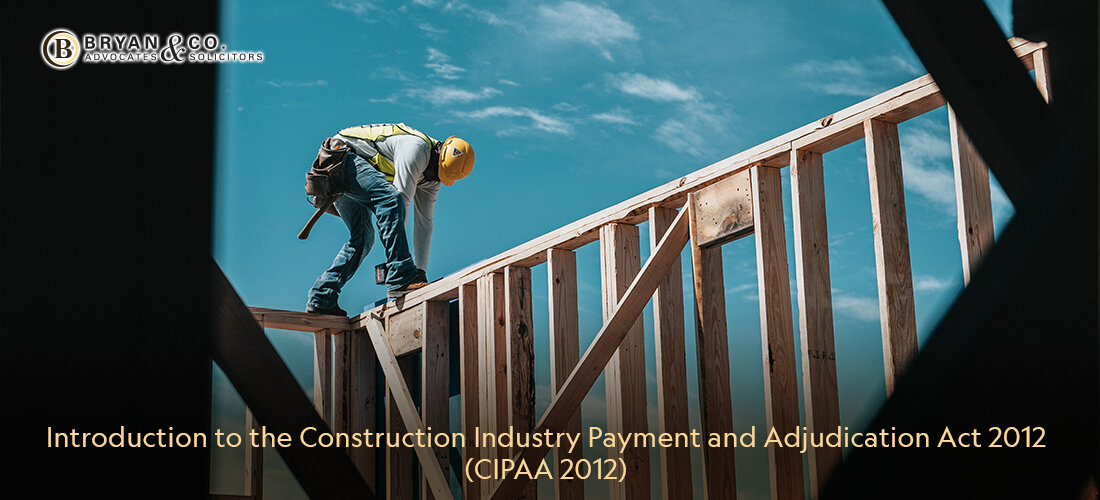
The Construction Industry Payment and Adjudication Act 2012 (“CIPAA 2012“) was enacted to address issues of delayed and non-payment in the construction industry. The law provides a framework for resolving payment disputes in a timely and efficient manner through adjudication. This article provides a brief overview of the CIPAA 2012.
Application of CIPAA 2012
CIPAA applies to all construction contracts entered into on or after 15 April 2014, regardless of whether the contract is in writing or not. It covers all types of construction work, including construction, engineering, and architectural services.
Section 4 defines ‘construction work’ as follows:
"construction work" means the construction, extension, installation, repair, maintenance, renewal, removal, renovation, alteration, dismantling, or demolition of:-
(a) any building, erection, edifice, structure, wall, fence or chimney, whether constructed wholly or partly above or below ground level;
(b) any road, harbour works, railway, cableway, canal or aerodrome;
(c) any drainage, irrigation or river control work;
(d) any electrical, mechanical, water, gas, oil, petrochemical or telecommunication work; or
(e) any bridge, viaduct, dam, reservoir, earthworks, pipeline, sewer, aqueduct, culvert, drive, shaft, tunnel or reclamation work,
and includes:-
(A) any work which forms an integral part of, or are preparatory to or temporary for the works described in paragraphs (a) to (e) , including site clearance, soil investigation and improvement, earth-moving, excavation, laying of foundation, site restoration and landscaping; and
(B) procurement of construction materials, equipment or workers, as necessarily required for any works described in paragraphs (a) to (e) ;- Section 4, Construction Industry Payment and Adjudication Act 2012 -
The Adjudication Process
To initiate the adjudication process, the claimant must serve a payment claim on the respondent, which must specify the amount claimed and the basis for the claim. The respondent must then serve a payment response within 10 working days of receiving the payment claim. If the respondent disputes the payment claim, either party may refer the dispute to adjudication by serving a notice of adjudication on the other party.
The adjudicator must make a decision within 45 working days of the respondent’s payment response, although this period may be extended by a further 30 working days with the consent of both parties. The adjudicator’s decision is binding on the parties, although it is subject to review by the courts.
Enforcement of Adjudication Decisions
It must be remembered that an adjudication decision under CIPAA 2012 is binding on the parties, although an application may be made to Court to set aside the decision, albeit on limited grounds. Hence, a party seeking to enforce an adjudication decision would have to apply to the High Court for such a decision to be enforced as if it is a judgment or order of the High Court.
This is provided for under Section 28 of CIPAA 2012, which reads as follows:
(1) A party may enforce an adjudication decision by applying to the High Court for an order to enforce the adjudication decision as if it is a judgment or order of the High Court.
(2) The High Court may make an order in respect of the adjudication decision either wholly or partly and may make an order in respect of interest on the adjudicated amount payable.
(3) The order made under subsection (2) may be executed in accordance with the rules on execution of the orders or judgment of the High Court.
- Section 28, Construction Industry Payment and Adjudication Act 2012 -
That being said, the Court of Appeal in the case of Likas Bay Precinct Sdn Bhd v Bina Puri Sdn Bhd [2019] 3 MLJ 244 held that adjudication decisions under CIPAA 2012 need not be first registered and enforced as a Court judgment before a winding-up petition is presented. However, other forms of enforcement would first require the decision to be registered for it to be enforced.
Conclusion
CIPAA 2012 has provided a clear framework for an expeditious resolution of payment disputes in the construction industry.
However, not all construction contracts can utilise the procedure under CIPAA 2012 as it does not apply to construction contracts entered into by a natural person for any construction work in respect of any building which is less than 4 storeys high and which is wholly intended for that natural person’s occupation.
Request Appointment
Contact us at +603 3000 8626 or email to general@brycolaw.com
